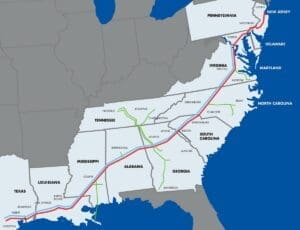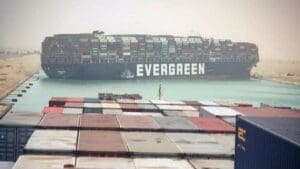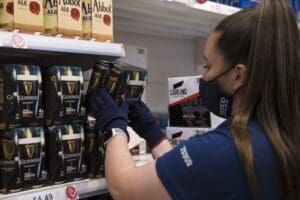 Today, May 14, marks 221 years since the 6th United States Congress recessed. It met at Congress Hall in Philadelphia, PA and in Washington, DC from March 4, 1799, to March 4, 1801, during the last two years of John Adams’ presidency. What makes this Congressional recess importance is the fact that it was the last time the US capital was located in Philadelphia. The Residence Act of July 16, 1790 put the wheels in motion to move the capital, but it took almost a decade for the capital to move to Washington DC. A big part of how it changed locations was a back-room deal between Alexander Hamilton, Thomas Jefferson, and James Madison in order to reorganize the government’s finances. Philadelphia lobbied for the capital to remain in Pennsylvania, but it was no use. Congress recessed on May 14, and the following day, May 15, the US Government officially moved to Washington DC. And now on to this week’s logistics news.
Today, May 14, marks 221 years since the 6th United States Congress recessed. It met at Congress Hall in Philadelphia, PA and in Washington, DC from March 4, 1799, to March 4, 1801, during the last two years of John Adams’ presidency. What makes this Congressional recess importance is the fact that it was the last time the US capital was located in Philadelphia. The Residence Act of July 16, 1790 put the wheels in motion to move the capital, but it took almost a decade for the capital to move to Washington DC. A big part of how it changed locations was a back-room deal between Alexander Hamilton, Thomas Jefferson, and James Madison in order to reorganize the government’s finances. Philadelphia lobbied for the capital to remain in Pennsylvania, but it was no use. Congress recessed on May 14, and the following day, May 15, the US Government officially moved to Washington DC. And now on to this week’s logistics news.
- Colonial Pipeline restarts operations, disruptions to continue
- Hours-of-service waiver issued in wake of pipeline cyberattack
- Royal Mail will start using drones to deliver packages
- Suez Canal chief says southern stretch to be expanded
- Descartes Systems acquires Portrix
- Tesco to scrap 50 million pieces of plastic from beers and ciders
- Mattel gives Barbie a green makeover with recycling program
- Amazon postpones Prime Day sale in Canada and India
 The biggest US gasoline pipeline was hit with a ransomware cyberattack, shutting down operations for several days. The Colonial Pipeline, which carries nearly half the fuel consumed along the US East Coast, blamed the attack on a shadowy criminal network called DarkSide. The cyberattack halted 2.5 million barrels per day of shipments of gasoline, diesel, and jet fuel last Friday, the most disruptive cyberattack ever on US energy infrastructure. Gas prices jumped just above $3 a gallon Wednesday, and many gas stations in the Southeast were out of fuel as panicking motorists rushed to fill up in the wake of the cyberattack. Colonial Pipeline said on Wednesday that it had initiated the restart of operations, but it will take several days for the product delivery supply chain to return to normal. Amid the concern of gas shortages, Bloomberg reports the Biden administration may consider waiving the Jones Act, passed in 1920, to allow foreign tankers to transport gasoline and diesel fuel.
The biggest US gasoline pipeline was hit with a ransomware cyberattack, shutting down operations for several days. The Colonial Pipeline, which carries nearly half the fuel consumed along the US East Coast, blamed the attack on a shadowy criminal network called DarkSide. The cyberattack halted 2.5 million barrels per day of shipments of gasoline, diesel, and jet fuel last Friday, the most disruptive cyberattack ever on US energy infrastructure. Gas prices jumped just above $3 a gallon Wednesday, and many gas stations in the Southeast were out of fuel as panicking motorists rushed to fill up in the wake of the cyberattack. Colonial Pipeline said on Wednesday that it had initiated the restart of operations, but it will take several days for the product delivery supply chain to return to normal. Amid the concern of gas shortages, Bloomberg reports the Biden administration may consider waiving the Jones Act, passed in 1920, to allow foreign tankers to transport gasoline and diesel fuel.
Late Tuesday night, the US Environmental Protection Agency (EPA) expanded an emergency fuel waiver allowing 12 states and the District of Columbia to sell off-spec gasoline through the end of the month to alleviate shortages caused by the Colonial Pipeline shutdown. The waiver allows sales of summer- or winter-grade gasoline with vapor pressure under 13.5 psi, and it allows any fuel handlers along the supply chain to comingle reformulated and conventional gasoline supplies as needed. The expanded waiver runs through May 31 and covers Alabama, Delaware, the District of Columbia, Georgia, parts of Florida, Louisiana, Maryland, Mississippi, North Carolina, Pennsylvania, South Carolina, Tennessee, and Virginia.
 Royal Mail is going to start using drones to deliver packages. The test will involve delivering health and safety equipment, Covid testing kits, and other items to the Isles of Scilly, an archipelago off the Cornish coast, in southwest England. The company said it will be first time an out-of-sight, autonomous scheduled drone flight has been used between the UK mainland and an island. Part of the trial will also include inter-island parcel deliveries across the Scillies. Parcels will be flown to the islands’ airport in St Mary’s by drone which can carry up to 220lb of mail at a time. A smaller drone will then be used to transport items to a number of delivery points throughout the islands. The autonomous flight route involves being around 70 miles out of sight before it reaches its destination.
Royal Mail is going to start using drones to deliver packages. The test will involve delivering health and safety equipment, Covid testing kits, and other items to the Isles of Scilly, an archipelago off the Cornish coast, in southwest England. The company said it will be first time an out-of-sight, autonomous scheduled drone flight has been used between the UK mainland and an island. Part of the trial will also include inter-island parcel deliveries across the Scillies. Parcels will be flown to the islands’ airport in St Mary’s by drone which can carry up to 220lb of mail at a time. A smaller drone will then be used to transport items to a number of delivery points throughout the islands. The autonomous flight route involves being around 70 miles out of sight before it reaches its destination.
 In March, the Ever Given became lodged in the Suez Canal, where it brought the global trade route to a standstill for six days. The impacts of the blockage are still being felt in global supply chains. In a televised address earlier this week, Suez Canal Chairman Osama Rabie announced that the Suez Canal Authority (SCA) plans to expand and deepen the southern stretch of the waterway. The SCA plans to widen the southernmost 18-mile stretch of the waterway between the city of Suez and the Bitter Lakes area by 130 feet eastwards. It also plans to deepen that section to 72 feet from 66 feet. A second canal lane that opened in 2015 north of the Great Bitter Lake to allow two-directional traffic would be extended by 6 miles on the southern side of the lake, to reach a total length of 51 miles and allowing more ships to pass. The project should be completed in 24 months at the most.
In March, the Ever Given became lodged in the Suez Canal, where it brought the global trade route to a standstill for six days. The impacts of the blockage are still being felt in global supply chains. In a televised address earlier this week, Suez Canal Chairman Osama Rabie announced that the Suez Canal Authority (SCA) plans to expand and deepen the southern stretch of the waterway. The SCA plans to widen the southernmost 18-mile stretch of the waterway between the city of Suez and the Bitter Lakes area by 130 feet eastwards. It also plans to deepen that section to 72 feet from 66 feet. A second canal lane that opened in 2015 north of the Great Bitter Lake to allow two-directional traffic would be extended by 6 miles on the southern side of the lake, to reach a total length of 51 miles and allowing more ships to pass. The project should be completed in 24 months at the most.
![]() Descartes Systems Group, a global leader in uniting logistics-intensive businesses in commerce, announced that it has acquired Portrix Logistics Software, a Germany-based provider of rate-management services for logistics services providers. Portrix’s main product, Global Price Management, enables customers to determine shipment routing, pricing, and capacity management. Descartes Chief Executive Edward J. Ryan said the acquisition will allow it to offer logistics companies a more complete range of services. Descartes acquired Portrix for roughly $26.7 million.
Descartes Systems Group, a global leader in uniting logistics-intensive businesses in commerce, announced that it has acquired Portrix Logistics Software, a Germany-based provider of rate-management services for logistics services providers. Portrix’s main product, Global Price Management, enables customers to determine shipment routing, pricing, and capacity management. Descartes Chief Executive Edward J. Ryan said the acquisition will allow it to offer logistics companies a more complete range of services. Descartes acquired Portrix for roughly $26.7 million.
 Sustainability continues to be a driving force for many companies. Tesco is set to become the first major retailer to scrap soft plastic rings and shrink wrap packaging from all beers and ciders across its UK stores. According to a statement from the company, the move will lead to 50 million fewer pieces of unrecycled plastic being produced each year. The move is part of Tesco’s ongoing 4Rs strategy (Remove, Reduce, Reuse, Recycle) set up to remove excess and non-recyclable material from its business and recycle the rest. Tesco said it would stop receiving beer and ciders that are held together by soft plastic rings and shrink wraps in early May. The retail giant said it expected to sell through the last remaining stock in the coming weeks and confirmed that it would not order beers or ciders that use this packaging in the future.
Sustainability continues to be a driving force for many companies. Tesco is set to become the first major retailer to scrap soft plastic rings and shrink wrap packaging from all beers and ciders across its UK stores. According to a statement from the company, the move will lead to 50 million fewer pieces of unrecycled plastic being produced each year. The move is part of Tesco’s ongoing 4Rs strategy (Remove, Reduce, Reuse, Recycle) set up to remove excess and non-recyclable material from its business and recycle the rest. Tesco said it would stop receiving beer and ciders that are held together by soft plastic rings and shrink wraps in early May. The retail giant said it expected to sell through the last remaining stock in the coming weeks and confirmed that it would not order beers or ciders that use this packaging in the future.
 Speaking of recycling, Mattel is giving its toys a green makeover with a new recycling initiative. The program, Mattel PlayBack, promises to give unloved old toys a second life by recycling their plastic parts into new products. The toy takeback program will help to keep old Barbies, Matchbox cars, and Mega construction bricks out of landfills. The program gives parents free shipping labels they can use to ship old toys back to Mattel. Mattel will sort the toys and process them for recycling. “For materials that cannot be repurposed as recycled content in new toys, Mattel PlayBack will either downcycle those materials into other plastic products or convert them from waste to energy.”
Speaking of recycling, Mattel is giving its toys a green makeover with a new recycling initiative. The program, Mattel PlayBack, promises to give unloved old toys a second life by recycling their plastic parts into new products. The toy takeback program will help to keep old Barbies, Matchbox cars, and Mega construction bricks out of landfills. The program gives parents free shipping labels they can use to ship old toys back to Mattel. Mattel will sort the toys and process them for recycling. “For materials that cannot be repurposed as recycled content in new toys, Mattel PlayBack will either downcycle those materials into other plastic products or convert them from waste to energy.”
 Last week I mentioned that Amazon is moving Prime Day up to the second quarter, a time where retail sales are generally slower. Well, it turns out this will not be a global Prime Day. Amazon has just announced it is pausing plans for its annual sale Prime Day in Canada and India due to concerns about Covid-19. India has seen Covid-19 cases soar, and the country is concerned about the potential for a third wave. In Canada, cases have also risen in recent months amid a slower-than-expected rollout of vaccinations, and less than 3 percent of the population is fully vaccinated.
Last week I mentioned that Amazon is moving Prime Day up to the second quarter, a time where retail sales are generally slower. Well, it turns out this will not be a global Prime Day. Amazon has just announced it is pausing plans for its annual sale Prime Day in Canada and India due to concerns about Covid-19. India has seen Covid-19 cases soar, and the country is concerned about the potential for a third wave. In Canada, cases have also risen in recent months amid a slower-than-expected rollout of vaccinations, and less than 3 percent of the population is fully vaccinated.
That’s all for this week. Enjoy the weekend and the song of the week, The Room Where It Happens from Hamilton.
















